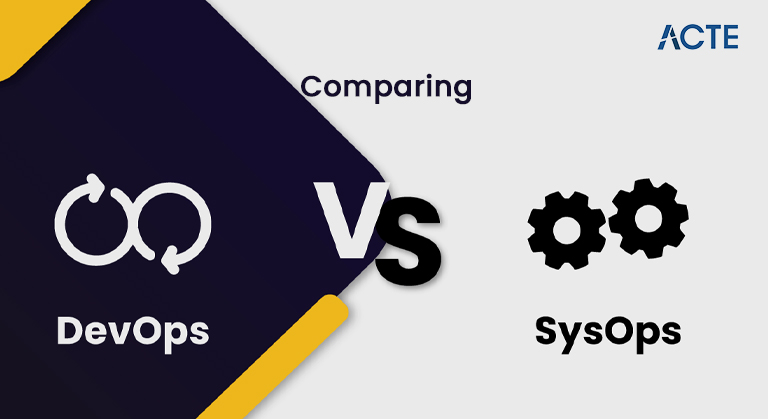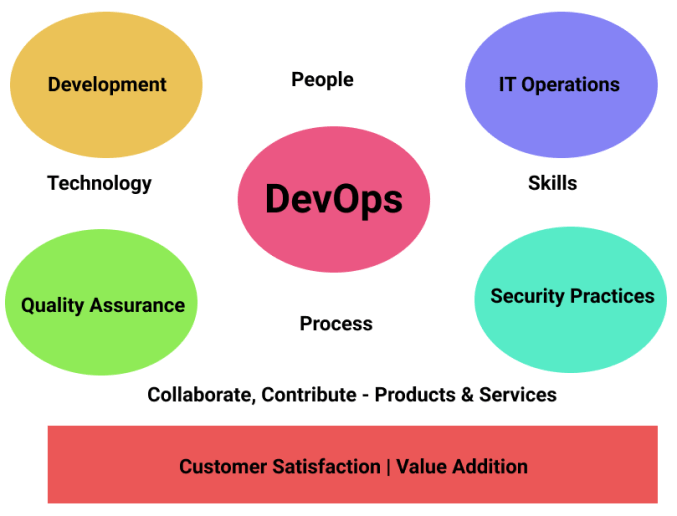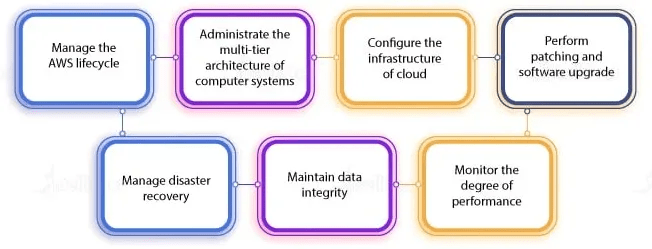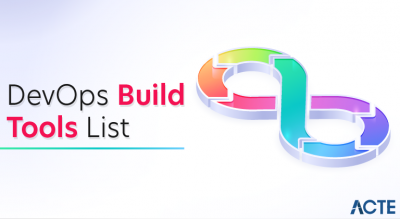
- Introduction to SysOps and DevOps
- Key Differences Between SysOps and DevOps
- Responsibilities of a SysOps Engineer
- Responsibilities of a DevOps Engineer
- Skillset Comparison: SysOps vs DevOps
- Tools Used in SysOps and DevOps
- Infrastructure Management in SysOps vs DevOps
- Automation in SysOps vs DevOps
- Deployment Strategies in SysOps vs DevOps
- Which Career Path is Better: SysOps or DevOps?
- Real-World Use Cases of SysOps and DevOps
- Conclusion
Introduction to SysOps and DevOps
In modern software development and IT operations, SysOps (Systems Operations) and DevOps (Development Operations) are two crucial approaches to managing infrastructure, automating workflows, and ensuring efficient application deployment and operation. Both disciplines have become prominent with the rise of cloud computing, continuous integration (CI), and continuous delivery (CD). Still, they approach the problem of managing IT infrastructure and software delivery from different perspectives. Devops Training primarily focuses on the administration, monitoring, and maintenance of IT infrastructure, ensuring that servers and other hardware run smoothly, efficiently, and securely.DevOps, on the other hand, emphasizes collaboration between development and IT operations teams to streamline the software development lifecycle, automate processes, and achieve faster delivery of quality software. Although both SysOps and DevOps share some overlap in the tools and technologies used, they focus on different goals, responsibilities, and methodologies in IT operations.
Key Differences Between SysOps and DevOps
While SysOps and DevOps are often used interchangeably, they are distinct approaches with unique goals and methodologies:
Focus Area
- SysOps is primarily concerned with maintaining and monitoring the infrastructure that supports the applications and systems. SysOps engineers ensure that systems are always available, secure, and optimized.
- DevOps focuses on the collaboration between development and IT operations teams to improve the software development lifecycle. It aims to integrate and automate the processes of coding, testing, deployment, and infrastructure management to deliver faster and more reliable software.
- SysOps involves automating repetitive tasks like system updates, configuration management, and monitoring. Practices and Tools in Devops ensures that the infrastructure runs smoothly and is scalable.
- DevOps takes automation further, focusing on end-to-end automation, such as automating code integration, deployment, testing, and monitoring. DevOps aims to improve collaboration between developers and operations teams by automating workflows from development through production.
- SysOps tends to rely on tools focusing on system administration, infrastructure monitoring, and configuration management, such as Nagios, Chef, Ansible, or Puppet.
- DevOps incorporates a broader set of tools that span the entire development lifecycle, including code versioning, CI/CD pipelines, containerization, orchestration, and monitoring, like Jenkins, GitLab, Kubernetes, Docker, and Terraform.
- SysOps often operates in a more siloed environment, where operations teams work separately from development teams.
- DevOps fosters a culture of collaboration between development and operations teams, aiming to break down silos and improve communication, which accelerates software delivery.
Approach to Automation
Tooling
Cultural Approach
Learn how to manage and deploy Devops services by joining this Devops Online Training today.
Responsibilities of a SysOps Engineer
A SysOps Engineer manages and supports the IT infrastructure that underpins an organization’s applications. Their primary duties include, Infrastructure Monitoring SysOps engineers ensure that all systems are running optimally. They monitor server performance, network connections, hardware health, and system logs to identify issues early. System Maintenance: Regularly performing maintenance tasks, such as installing software updates, patch management, and hardware upgrades. Devops Automation Tools Enhancing Efficiency Quickly identifying and fixing any issues related to system downtime, application performance problems, or other operational matters. Security Management Ensuring that best practices are followed, such as implementing firewalls and intrusion detection systems and ensuring access controls. Backup and Disaster Recovery: Implementing and managing backup strategies and disaster recovery plans to protect against data loss. Capacity Planning Monitoring system performance and recommending scaling infrastructure to meet growing demands.
Responsibilities of a DevOps Engineer

A DevOps Engineer bridges the gap between development and IT operations. Their responsibilities center around automating and streamlining processes throughout the software development lifecycle. The primary duties include, Automation of Development Workflows: DevOps engineers automate the building, testing, and deployment processes using tools like Jenkins, GitLab CI/CD, and Docker to ensure faster and more reliable software delivery. CI/CD Pipeline Management Setting up and managing continuous integration (CI) and continuous delivery (CD) pipelines to enable rapid, automated software deployment. Collaboration Encouraging collaboration between development and operations teams to align software development with infrastructure needs. Infrastructure as Code (IaC) Managing and provisioning infrastructure using code, often with tools like Terraform, Ansible, or Devops Engineer vs Cloud Engineer, which makes infrastructure provisioning repeatable and scalable. Monitoring and Logging DevOps engineers also monitor systems and application performance using tools like Prometheus, Grafana, or ELK Stack (Elasticsearch, Logstash, Kibana) to ensure applications perform well in production. Cloud Management DevOps engineers often manage cloud environments like AWS, Azure, or Google Cloud, ensuring that infrastructure is scalable and can support application needs.
Unlock your potential in Devops with this Devops Online Training .
Skillset Comparison: SysOps vs DevOps
While SysOps and DevOps engineers share some common knowledge, such as networking and cloud computing, their skills diverge in several ways:
SysOps Engineer Skills:
- System Administration: Knowledge of operating systems (Linux, Windows Server), server management, and infrastructure services (DNS, DHCP).
- Networking: Understanding network protocols, subnets, and virtual private networks (VPNs).
- Security and Compliance: Skills in securing servers, data encryption, firewalls, and other security mechanisms.
- Performance Tuning: Expertise in optimizing hardware and software for peak performance.
- Automation Tools: Proficiency with tools like Chef, Puppet, Ansible, and SaltStack for infrastructure automation.
- Monitoring: Using tools like Nagios, Zabbix, and Prometheus to track system health.
DevOps Engineer Skills:
- Programming: Knowledge of programming/scripting languages (Python, Ruby, Bash, Go) for automating tasks.
- CI/CD Tools: Experience with tools like Jenkins, GitLab continuous integration, or CircleCI for automating builds and deployments.
- Containerization and Orchestration: Expertise with Docker, Kubernetes, and OpenShift for building, deploying, and A Comprehensive Devops Maturity Model, containerized applications.
- Infrastructure as Code (IaC): Proficiency with tools like Terraform, CloudFormation, or Ansible to programmatically provision and manage cloud infrastructure.
- Version Control: Familiarity with version control systems like Git for managing source code.
- Collaboration Tools: Ability to work with collaboration and communication tools like Slack, Jira, or Confluence.
Tools Used in SysOps and DevOps
SysOps Tools:
- Nagios: Used to monitor system health and performance.
- Chef/Puppet/Ansible: Tools for automating system configurations.
- Zabbix: A network and infrastructure monitoring tool.
- Splunk: For log management and analysis.
- Docker (for SysOps): While primarily used in Devops Training , SysOps can use Docker to manage containers in isolated environments.
- Jenkins: An open-source automation tool for continuous integration and continuous delivery.
- Kubernetes: A container orchestration tool for automating the deployment and scaling of containerized applications.
- Terraform: An infrastructure as a code tool for managing cloud resources.
- GitLab CI/CD: An integrated CI/CD pipeline tool that automates the software development lifecycle.
- Docker: For creating, deploying, and running containerized applications.
- Prometheus/Grafana: Monitoring and alerting tools for tracking application performance in real time.
- SysOps focuses on managing physical and virtual infrastructure, ensuring that the servers and networks are configured, optimized, and secure. They oversee all aspects of system performance, uptime, and reliability.
- DevOps focuses on the infrastructure that supports the development process, leveraging tools like Terraform and Kubernetes to provision, scale, and manage infrastructure as code. DevOps engineers prioritize scalability, automation, and collaboration between development and operations teams.
- SysOps automates routine infrastructure management tasks like system updates, patches, and backup management. While SysOps engineers automate at the infrastructure level, they don’t necessarily automate the entire application lifecycle.
- DevOps takes automation a step further by automating infrastructure provisioning, application deployment, testing, and integration. This enables a continuous feedback loop, facilitating rapid, reliable software delivery.
- SysOps may handle manual or scheduled deployments with a strong focus on stability, compliance, and minimal disruption.
- DevOps follows automated deployment strategies, such as rolling updates or blue/green deployments, to ensure continuous delivery and reduce downtime.
- Cloud Hosting: Managing and maintaining the underlying infrastructure for cloud services like AWS or Azure.
- Data Center Operations: Ensuring uptime and reliability for physical or virtual servers in large data centers.
- E-commerce Platforms: Automating deployment pipelines to ensure continuous feature delivery and quick bug fixes for online retail platforms.
- Social Media Apps: Ensuring rapid deployment of updates and infrastructure scaling to handle spikes in user traffic.
DevOps Tools:
Looking to master Devops? Sign up for ACTE’s Devops Master Program Training Course and begin your journey today!
Infrastructure Management in SysOps vs DevOps

Automation in SysOps vs DevOps
Deployment Strategies in SysOps vs DevOps
Which Career Path is Better: SysOps or DevOps?
Choosing between a career in SysOps or DevOps depends on your interests and the direction you want your career to take. If you enjoy system administration, infrastructure management, and ensuring uptime, Exploring Agile vs Devops may be the right fit. However, if you’re more interested in collaboration, automation, and improving the software development lifecycle, a career in DevOps might be a better fit. While both fields are closely related, DevOps is generally considered a more progressive and innovative career path due to its focus on automation, collaboration, and continuous delivery.
Real-World Use Cases of SysOps and DevOps
SysOps:
DevOps:
Boost your chances in Devops interviews by checking out our blog on Devops Interview Questions and Answers!
Conclusion
The choice between SysOps and DevOps largely depends on your business’s needs. If your organization focuses on maintaining reliable infrastructure and minimizing downtime, SysOps remains essential. However, embracing DevOps will be more advantageous if you want to foster collaboration, automate your development pipeline, and deliver software faster and more reliably. For many Devops Training , the future lies in integrating both practices. By combining the strengths of SysOps for system management and DevOps for streamlined, automated development and deployment, companies can build efficient, scalable, and robust IT systems that keep up with the demands of modern software development.





